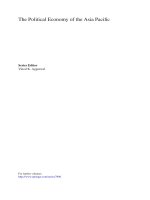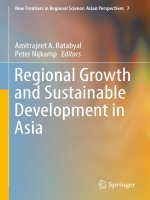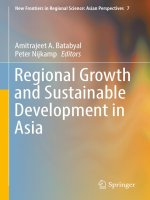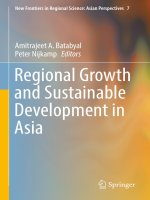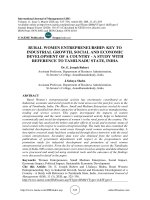Economic growth and economic development 159
Bạn đang xem bản rút gọn của tài liệu. Xem và tải ngay bản đầy đủ của tài liệu tại đây (84.92 KB, 1 trang )
Introduction to Modern Economic Growth
1
USA
SWE
BGD
.8
GBR
CAN
NLD
DNK
Capital productivity
.4
.6
JPN
NZL
COL
IRL
GRC
URY
THA
PAN
PRT
YUG
CHE
AUT
ITA
ISR
HKG ESP
PAK
DEU
FIN BEL
NOR
FRA
TTO
SGP
.2
IDN
LKA
0
.2
.4
.6
Labor productivity
Figure 3.5. Comparison of labor-productivity
productivity differences across countries.
.8
and
1
capital-
where Rj is the rental rate of capital in country j and wj is the observed wage rate
(which includes the compensation to human capital) in country j. Equation (3.31),
for example, states that if workers in a particular country have, on average, half the
efficiency units as those in the United States, their earnings should be roughly half
of American workers.
With data on factor prices, we can therefore construct an alternative series for
Akj and Ahj ’s. It turns out that the series for Akj and Ahj ’s implied by (3.29), (3.30)
and (3.31) are very similar, so there appears to be some validity to this approach.
Given this validation, we can presume that there is some information in the numbers
that Trefler obtains.
The following figure shows Trefler’s original estimates.
These numbers imply that there are very large differences in labor productivity, and some substantial, but much smaller differences in capital productivity. For
145



